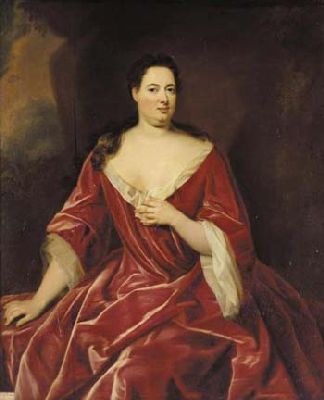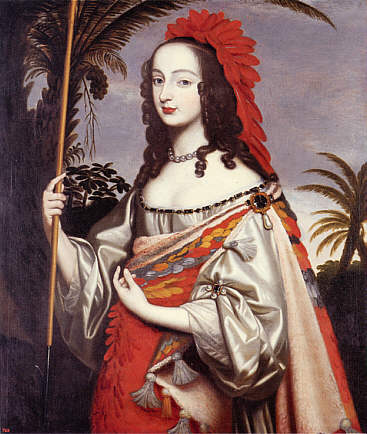|
Clara Elisabeth Von Platen
Clara Elisabeth, Countess von Platen-Hallermund (14 January 1648 — 30 January 1700, Schloss Monplaisir, in what is now the Von-Alten-Garten in Hannover) was a German noblewoman, most notable as the mistress of Ernest Augustus (Elector of Hanover, father of George I of Great Britain) and for her involvement in the Königsmarck affair. Early life She was the eldest daughter of Georg Philipp von Meysenbug-Züschen (1610-1669) and his wife, who was also his relative, Anna Elisabeth von Meysenbug (1620-1681). Court life Clara Elisabeth's father tried to get her and her sister Catharina positions at the French court at Versailles. When this attempt failed, he placed them at the court of Ernest Augustus, where Clara Elisabeth served as lady-in-waiting to the Duchess Sophia and attracted the Duke's attention. Exerting great influence on him, she bore him two children: Ernst August (1674–1726) and Sophia von Kielmansegg (1675–1717). In spite of being the Duke's / Elector's ... [...More Info...] [...Related Items...] OR: [Wikipedia] [Google] [Baidu] |
Sophia Von Kielmansegg, Countess Of Darlington
Sophia Charlotte von Kielmansegg, Countess of Darlington and Countess of Leinster (1675–1725) was a German-born courtier. A half-sister of George I of Great Britain, to whom she was close, she moved to England in 1714 shortly after the Hanoverian succession, where she became an influential figure of his court. Background She was the daughter of Clara Elisabeth von Meysenburg, married to Franz Ernst, Count von Platen-Hallermund, a court official, but mistress of Ernest Augustus, Elector of Brunswick-Lüneburg, married to Sophia of the Palatine who was in the line of succession of the kingdoms of England and Scotland. At the court of Ernest Augustus, her status was as an illegitimate daughter of the Elector, who was the father of George Louis, Elector of Hanover from 1698 and the future British king, with whom she shared a close loyalty and abiding friendship. In England At the London court of George I, Sophia von Kielmansegg vied with Melusine von der Schulenburg, Duchess of Ke ... [...More Info...] [...Related Items...] OR: [Wikipedia] [Google] [Baidu] |
Monplaisir Palace
The Monplaisir Palace is part of the Peterhof Palace Complex, Russia Russia (, , ), or the Russian Federation, is a List of transcontinental countries, transcontinental country spanning Eastern Europe and North Asia, Northern Asia. It is the List of countries and dependencies by area, largest country in the .... a Peterhof Museum webpage See also * Monplaisir GardenReferences {{coord, 59.8872, 29.9192, type:landmark_region:RU, display=title Palaces in Petergof[...More Info...] [...Related Items...] OR: [Wikipedia] [Google] [Baidu] |
Hannover
Hanover (; german: Hannover ; nds, Hannober) is the capital and largest city of the German States of Germany, state of Lower Saxony. Its 535,932 (2021) inhabitants make it the List of cities in Germany by population, 13th-largest city in Germany as well as the fourth-largest city in Northern Germany after Berlin, Hamburg and Bremen. Hanover's urban area comprises the towns of Garbsen, Langenhagen and Laatzen and has a population of about 791,000 (2018). The Hanover Region has approximately 1.16 million inhabitants (2019). The city lies at the confluence of the River Leine and its tributary the Ihme, in the south of the North German Plain, and is the largest city in the Hannover–Braunschweig–Göttingen–Wolfsburg Metropolitan Region. It is the fifth-largest city in the Low German dialect area after Hamburg, Dortmund, Essen and Bremen. Before it became the capital of Lower Saxony in 1946, Hannover was the capital of the Principality of Calenberg (1636–1692), the Electorat ... [...More Info...] [...Related Items...] OR: [Wikipedia] [Google] [Baidu] |
Ernest Augustus, Elector Of Brunswick-Lüneburg
Ernest Augustus (german: Ernst August; 20 November 1629 – 23 January 1698) was ruler of the Principality of Lüneburg from 1658 and of the Principality of Calenberg from 1679 until his death, and father of George I of Great Britain. He was appointed as the ninth prince-elector of the Holy Roman Empire in 1692, but died before the appointment became effective. He was also ruler of the Prince-Bishopric of Osnabrück from 1662 until his death. Early life and marriage Ernest Augustus was born on 20 November 1629 at Herzberg Castle near Göttingen, Principality of Calenberg, the youngest son of George, Duke of Brunswick-Calenberg and Prince of Calenberg, and Anne Eleonore of Hesse-Darmstadt. On 30 September 1658, he married Sophia of the Palatinate in Heidelberg.Cavendish, Richard"Sophia of Hanover Dies" ''History Today'', Vol. 64 Issue 6, June 2014 She was the daughter of Frederick V, Elector Palatine and Elizabeth Stuart of England, and granddaughter of King James I of Eng ... [...More Info...] [...Related Items...] OR: [Wikipedia] [Google] [Baidu] |
Sophia Dorothea Of Celle
Sophia Dorothea of Brunswick-Lüneburg-Celle (15 September 1666 – 13 November 1726) was the repudiated wife of future King George I of Great Britain. The union with George, her first cousin, was a marriage of state, arranged by her father George William, her father-in-law the Elector of Hanover, and her mother-in-law, Electress Sophia of Hanover, first cousin of King Charles II of England. Sophia Dorothea is best remembered for her alleged affair with Count Philip Christoph von Königsmarck that led to her being imprisoned in the Castle of Ahlden for the last thirty years of her life. Life Early years Born in Celle on 15 September 1666, Sophia Dorothea was the only surviving daughter of George William, Duke of Brunswick-Lüneburg, by his morganatic wife Eléonore Desmier d'Olbreuse (1639–1722), Lady of Harburg, a French Huguenot noblewoman. Sophia Dorothea appears to have grown up in a carefree and loving environment. Her father transferred large assets to her over time ... [...More Info...] [...Related Items...] OR: [Wikipedia] [Google] [Baidu] |
Palace Of Versailles
The Palace of Versailles ( ; french: Château de Versailles ) is a former royal residence built by King Louis XIV located in Versailles, Yvelines, Versailles, about west of Paris, France. The palace is owned by the French Republic and since 1995 has been managed, under the direction of the Ministry of Culture (France), French Ministry of Culture, by the Public Establishment of the Palace, Museum and National Estate of Versailles. Some 15,000,000 people visit the palace, park, or gardens of Versailles every year, making it one of the most popular tourist attractions in the world. Louis XIII built a simple hunting lodge on the site of the Palace of Versailles in 1623 and replaced it with a small château in 1631–34. Louis XIV expanded the château into a palace in several phases from 1661 to 1715. It was a favorite residence for both kings, and in 1682, Louis XIV moved the seat of his court and government to Versailles, making the palace the ''de facto'' capital of France. This ... [...More Info...] [...Related Items...] OR: [Wikipedia] [Google] [Baidu] |
Lady-in-waiting
A lady-in-waiting or court lady is a female personal assistant at a court, attending on a royal woman or a high-ranking noblewoman. Historically, in Europe, a lady-in-waiting was often a noblewoman but of lower rank than the woman to whom she attended. Although she may either have received a retainer or may not have received compensation for the service she rendered, a lady-in-waiting was considered more of a secretary, courtier, or companion to her mistress than a servant. In other parts of the world, the lady-in-waiting, often referred to as ''palace woman'', was in practice a servant or a slave rather than a high-ranking woman, but still had about the same tasks, functioning as companion and secretary to her mistress. In courts where polygamy was practised, a court lady was formally available to the monarch for sexual services, and she could become his wife, consort, courtesan, or concubine. ''Lady-in-waiting'' or ''court lady'' is often a generic term for women whose r ... [...More Info...] [...Related Items...] OR: [Wikipedia] [Google] [Baidu] |
Sophia Of Hanover
Sophia of Hanover (born Princess Sophia of the Palatinate; 14 October 1630 – 8 June 1714) was the Electress of Hanover by marriage to Elector Ernest Augustus and later the heiress presumptive to the thrones of England and Scotland (later Great Britain) and Ireland under the Act of Settlement 1701, as a granddaughter of James VI and I. Princess Sophia died less than two months before she would have become Queen of Great Britain. Consequently, her son (and grandson of Elizabeth Stuart, Queen of Bohemia) George I, succeeded her first cousin once removed, Queen Anne, to the British throne, and the succession to the throne has since been defined as, and composed entirely of, her legitimate and Protestant descendants. Sophia was born in 1630 to Frederick V of the Palatinate, a member of the House of Wittelsbach, and Elizabeth Stuart, daughter of King James VI and I. She grew up in the Dutch Republic, where her family had sought refuge after the sequestration of their Electorate d ... [...More Info...] [...Related Items...] OR: [Wikipedia] [Google] [Baidu] |
Platen (Pomeranian Family)
The House of Platen is a feudal noble family originally from Pomerania. The branch of Platen-Hallermund was a mediatized one and as such was part of the small circle of families that belonged to the High nobility in Germany. History The family's earliest known ancestor is Otto "cum plata", who was first mentioned in 1252 as Vogt of Jaromar II, Prince of Rügen. The line of Platen-Hallermund (not actually related to the Platen family, but a bastard line of the Guelphs), which was raised to the rank of Imperial count in 1689 by Leopold I, Holy Roman Emperor, acquired the County of Hallermund in 1704 and therefore belonged to the high nobility since 1709. As a consequence of the Napoleonic wars the family was mediatized by Westphalia in 1807 and was later ceded to Hanover in 1813. The male line of the Counts of Platen-Hallermund exist until today and live in Germany. Swedish branch Several branches of the family live in Sweden, where members have been noted statesmen and high offici ... [...More Info...] [...Related Items...] OR: [Wikipedia] [Google] [Baidu] |
Paul Morand
Paul Morand (13 March 1888 – 24 July 1976) was a French author whose short stories and novellas were lauded for their style, wit and descriptive power. His most productive literary period was the interwar period of the 1920s and 1930s. He was much admired by the upper echelons of society and the artistic avant-garde who made him a cult favorite. He has been categorized as an early Modernist and Imagist. Morand was a graduate of the Paris Institute of Political Studies, preparing him for a diplomatic career, and also attended Oxford University. A member of the upper class and married into wealth, he held various diplomatic posts and traveled widely. He was typical of those in his social group who enjoyed lives of privilege and entitlement, adhering to the inevitability and desirability of class distinction. Morand espoused a reflexive adherence to racial, ethnic and anti-Semitic ideologies. His intellectual influences included the writing of Friedrich Nietzsche, Oswald Spengler ... [...More Info...] [...Related Items...] OR: [Wikipedia] [Google] [Baidu] |

.jpg)

_und_ihre_Kinder_Georg_August_und_Sophie_Dorothea.jpg)



